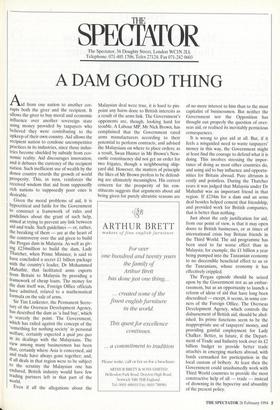SPECT"AT OR
The Spectator, 56 Doughty Street, London WC1N 2LL Telephone: 071-405 1706; Telex 27124; Fax 071-242 0603
A DAM GOOD THING
A'd from one nation to another cor- rupts both the giver and the recipient. It allows the giver to buy moral and economic influence over another sovereign state using money provided by taxpayers who believed they were contributing to the Upkeep of their own country. Aid allows the recipient nation to condone uncompetitive practices in its industries, since those indus- tries become shielded by subsidy from eco- nomic reality. Aid discourages innovation, and it debases the currency of the recipient nation. Such inefficient use of wealth by the donor country retards the growth of world Prosperity. This, in turn, reinforces the received wisdom that aid from supposedly rich nations to supposedly poor ones is desirable.
Given the moral problems of aid, it is hypocritical and futile for the Government to construct a framework of rules and guidelines about the grant of such help, aimed at trying to prevent any link between aid and trade. Such guidelines — or, rather, the breaking of them — are at the heart of the controversy over the aid given to build the Pergau dam in Malaysia. As well as giv- ing £234million to build the dam, Lady Thatcher, when Prime Minister, is said to have concluded a secret £1 billion package With the country's leader, Dr Mohammed Mahathir, that facilitated arms exports from Britain to Malaysia by providing a framework of cheap loans. The money for the dam itself was, Foreign Office officials have admitted, related to a mathematical formula on the sale of arms.
Sir Tim Lankester, the Permanent Secre- tary of the Overseas Development Agency, has described the dam as 'a bad buy', which is scarcely the point. The Government, Which has railed against the concept of the something for nothing society' in personal welfare, certainly expected a quid pro quo in its dealings with the Malaysians. The view among many businessmen has been that, certainly where Asia is concerned, aid and trade have always gone together; and, If all deals in that region were to be subject to the scrutiny the Malaysian one has endured, British industry would have few trading partners left in that part of the world.
Even if all the allegations about the Malaysian deal were true, it is hard to pin- point any harm done to British interests as a result of the arms link. The Government's opponents are, though, looking hard for trouble. A Labour MP, Mr Nick Brown, has complained that the Government rated arms manufacturers according to their potential to perform contracts, and advised the Malaysians on where to place orders; as a result, Swan Hunter in Mr Brown's New- castle constituency did not get an order for two frigates, though a neighbouring ship- yard did. However, the matters of principle the likes of Mr Brown profess to be defend- ing are ultimately meaningless. His correct concern for the prosperity of his con- stituents suggests that arguments about aid being given for purely altruistic reasons are of no more interest to him than to the most capitalist of businessmen. But neither the Government nor the Opposition has thought out properly the question of over- seas aid, or realised its inevitably pernicious consequences.
It is wrong to give aid at all. But, it it feels a misguided need to waste taxpayers' money in this way, the Government might at least find the courage to defend what it is doing. This involves stressing the impor- tance of doing as most other countries do, and using aid to buy influence and opportu- nities for Britain abroad. Pure altruism is costly and pointless. During the Thatcher years it was judged that Malaysia under Dr Mahathir was an important friend in that region. If £234m for a dam and an arms deal besides helped cement that friendship, and provided work for British companies, that is better than nothing.
Just about the only justification for aid, from our point of view, is that it may open doors to British businesses, or at times of international crisis buy Britain friends in the Third World. The aid programme has been used to far worse effect than in Malaysia; for example, the L1 billion a year being pumped into the Tanzanian economy to no discernible beneficial effect to us or the Tanzanians, whose economy it has effectively crippled.
The Pergau episode should be seized upon by the Government not as an embar- rassment, but as an opportunity to launch a
reform of ideas of aid that have long been discredited — except, it seems, in some cor-
ners of the Foreign Office. The Overseas Development Agency, which controls the disbursement of British aid, should be abol- ished. Its prime functions seem to be the inappropriate use of taxpayers' money, and providing gainful employment for Lady Chalker. Better, in future, if the Depart- ment of Trade and Industry took over its £2 billion budget to provide better •trade attaches in emerging markets abroad, with funds earmarked for participation in the local custom of bribery. At least then the Government could unashamedly work with Third World countries to provide the most constructive help of all — trade — instead of drowning in the hypocrisy and absurdity of the present policy.


























































 Previous page
Previous page